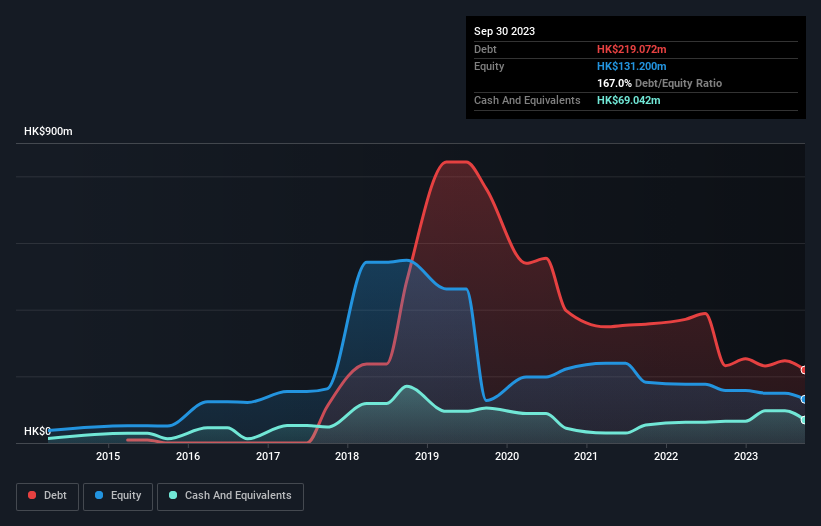- Hong Kong
- /
- Food and Staples Retail
- /
- SEHK:8057
Would Madison Holdings Group (HKG:8057) Be Better Off With Less Debt?

Warren Buffett famously said, 'Volatility is far from synonymous with risk.' So it seems the smart money knows that debt - which is usually involved in bankruptcies - is a very important factor, when you assess how risky a company is. Importantly, Madison Holdings Group Limited (HKG:8057) does carry debt. But the real question is whether this debt is making the company risky.
Why Does Debt Bring Risk?
Debt assists a business until the business has trouble paying it off, either with new capital or with free cash flow. In the worst case scenario, a company can go bankrupt if it cannot pay its creditors. However, a more usual (but still expensive) situation is where a company must dilute shareholders at a cheap share price simply to get debt under control. By replacing dilution, though, debt can be an extremely good tool for businesses that need capital to invest in growth at high rates of return. The first thing to do when considering how much debt a business uses is to look at its cash and debt together.
See our latest analysis for Madison Holdings Group
What Is Madison Holdings Group's Debt?
As you can see below, Madison Holdings Group had HK$219.1m of debt at September 2023, down from HK$232.0m a year prior. However, it does have HK$69.0m in cash offsetting this, leading to net debt of about HK$150.0m.

How Strong Is Madison Holdings Group's Balance Sheet?
Zooming in on the latest balance sheet data, we can see that Madison Holdings Group had liabilities of HK$254.2m due within 12 months and liabilities of HK$3.08m due beyond that. On the other hand, it had cash of HK$69.0m and HK$265.1m worth of receivables due within a year. So it actually has HK$76.9m more liquid assets than total liabilities.
This luscious liquidity implies that Madison Holdings Group's balance sheet is sturdy like a giant sequoia tree. On this view, lenders should feel as safe as the beloved of a black-belt karate master. When analysing debt levels, the balance sheet is the obvious place to start. But it is Madison Holdings Group's earnings that will influence how the balance sheet holds up in the future. So if you're keen to discover more about its earnings, it might be worth checking out this graph of its long term earnings trend.
In the last year Madison Holdings Group had a loss before interest and tax, and actually shrunk its revenue by 29%, to HK$81m. To be frank that doesn't bode well.
Caveat Emptor
Not only did Madison Holdings Group's revenue slip over the last twelve months, but it also produced negative earnings before interest and tax (EBIT). Indeed, it lost a very considerable HK$18m at the EBIT level. Having said that, the balance sheet has plenty of liquid assets for now. That should give the business time to grow its cashflow. The company is risky because it will grow into the future to get to profitability and free cash flow. When analysing debt levels, the balance sheet is the obvious place to start. But ultimately, every company can contain risks that exist outside of the balance sheet. We've identified 2 warning signs with Madison Holdings Group (at least 1 which can't be ignored) , and understanding them should be part of your investment process.
If you're interested in investing in businesses that can grow profits without the burden of debt, then check out this free list of growing businesses that have net cash on the balance sheet.
If you're looking to trade Madison Holdings Group, open an account with the lowest-cost platform trusted by professionals, Interactive Brokers.
With clients in over 200 countries and territories, and access to 160 markets, IBKR lets you trade stocks, options, futures, forex, bonds and funds from a single integrated account.
Enjoy no hidden fees, no account minimums, and FX conversion rates as low as 0.03%, far better than what most brokers offer.
Sponsored ContentNew: Manage All Your Stock Portfolios in One Place
We've created the ultimate portfolio companion for stock investors, and it's free.
• Connect an unlimited number of Portfolios and see your total in one currency
• Be alerted to new Warning Signs or Risks via email or mobile
• Track the Fair Value of your stocks
Have feedback on this article? Concerned about the content? Get in touch with us directly. Alternatively, email editorial-team (at) simplywallst.com.
This article by Simply Wall St is general in nature. We provide commentary based on historical data and analyst forecasts only using an unbiased methodology and our articles are not intended to be financial advice. It does not constitute a recommendation to buy or sell any stock, and does not take account of your objectives, or your financial situation. We aim to bring you long-term focused analysis driven by fundamental data. Note that our analysis may not factor in the latest price-sensitive company announcements or qualitative material. Simply Wall St has no position in any stocks mentioned.
About SEHK:8057
Madison Holdings Group
An investment holding company, retails and wholesales wine products and other alcoholic beverages in the People’s of Republic of China and Hong Kong.
Excellent balance sheet and slightly overvalued.
Market Insights
Community Narratives



